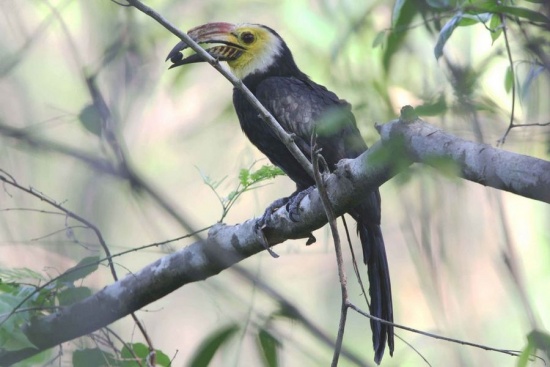(additional info) |
(genus change (Clements and IOC)) |
||
| Line 1: | Line 1: | ||
'''Alternative names: Sulawesi Tarictic Hornbill; Celebes Hornbill; Sulawesi Dwarf-Hornbill; Temminck's Hornbill''' | '''Alternative names: Sulawesi Tarictic Hornbill; Celebes Hornbill; Sulawesi Dwarf-Hornbill; Temminck's Hornbill''' | ||
[[Image:SulawesiHornbill.jpg|thumb|550px|right|Male ssp ''sanfordi''<br />Photo by {{user|martinuk|martinuk}}<br>Karaenta, Makassar, Sulawesi Selatan, [[Indonesia]], October, 2009]] | [[Image:SulawesiHornbill.jpg|thumb|550px|right|Male ssp ''sanfordi''<br />Photo by {{user|martinuk|martinuk}}<br>Karaenta, Makassar, Sulawesi Selatan, [[Indonesia]], October, 2009]] | ||
| − | ;[[:Category: | + | ;[[:Category:Rhabdotorrhinus|Rhabdotorrhinus]] exarhatus |
==Identification== | ==Identification== | ||
53cm. A small, black Hornbill. | 53cm. A small, black Hornbill. | ||
| Line 14: | Line 14: | ||
==Taxonomy== | ==Taxonomy== | ||
There are two subspecies of the Sulawesi Hornbill: | There are two subspecies of the Sulawesi Hornbill: | ||
| − | * '' | + | * ''R. e. exarhatus'' in north Sulawesi |
| − | * '' | + | * ''R. e. sanfordi'' in central, east and south Sulawesi, Buton and Muna Island |
| − | Has been treated conspecific with the other species of | + | Has been treated conspecific with the other species of its former genus [[:Category:Penelopides|Penelopides]]. |
==Habitat== | ==Habitat== | ||
Tropical lowland, swamps and primary forests.<br /> | Tropical lowland, swamps and primary forests.<br /> | ||
| Line 25: | Line 25: | ||
A sedentary and territorial species. | A sedentary and territorial species. | ||
==References== | ==References== | ||
| − | #{{Ref-HBWVol6}}#{{Ref- | + | #{{Ref-HBWVol6}}#{{Ref-Clements6thAug15}} |
{{ref}} | {{ref}} | ||
==External Links== | ==External Links== | ||
| − | {{GSearch| | + | {{GSearch|Hornbill+exarhatus}} |
*[http://www.orientalbirdimages.org/birdimages.php?action=birdspecies&Bird_ID=323&Bird_Image_ID=13001&Bird_Family_ID=70 View more images of this species on Orientalbirdimages] | *[http://www.orientalbirdimages.org/birdimages.php?action=birdspecies&Bird_ID=323&Bird_Image_ID=13001&Bird_Family_ID=70 View more images of this species on Orientalbirdimages] | ||
| − | [[Category:Birds]] [[Category: | + | [[Category:Birds]] [[Category:Rhabdotorrhinus]] |
Revision as of 18:21, 27 August 2015
Alternative names: Sulawesi Tarictic Hornbill; Celebes Hornbill; Sulawesi Dwarf-Hornbill; Temminck's Hornbill
- Rhabdotorrhinus exarhatus
Identification
53cm. A small, black Hornbill.
- Black plumage with green gloss on back
- Male with white facial and throat plumage, stained yellow
- Bill pale yellow, black base at lower mandible, sanfordi with pale creamy yellow ridges across lower mandible
- Female smaller, all black plumage and blacker bill and casque
Juveniles with smaller bill, undeveloped casque
Distribution
Endemic to Sulawesi, Indonesia.
Locally common, however loss of lowland forest has fragmented its range.
Taxonomy
There are two subspecies of the Sulawesi Hornbill:
- R. e. exarhatus in north Sulawesi
- R. e. sanfordi in central, east and south Sulawesi, Buton and Muna Island
Has been treated conspecific with the other species of its former genus Penelopides.
Habitat
Tropical lowland, swamps and primary forests.
Mostly below 650m, sometimes up to 1100m.
Behaviour
The diet includes fruits, figs and insects.
Breeding start from March to April, breeds in pairs, sometimes co-operative in small groups. The female seals herself inside a tree hole for egg-laying. During this time, the male will provide food for the female and the young. Lays 2-3 eggs.
A sedentary and territorial species.
References
- Del Hoyo, J, A Elliot, and J Sargatal, eds. 2001. Handbook of the Birds of the World. Volume 6: Mousebirds to Hornbills. Barcelona: Lynx Edicions. ISBN 978-8487334306
- Clements, J. F., T. S. Schulenberg, M. J. Iliff, D. Roberson, T. A. Fredericks, B. L. Sullivan, and C. L. Wood. 2015. The eBird/Clements checklist of birds of the world: v2015, with updates to August 2015. Downloaded from http://www.birds.cornell.edu/clementschecklist/download/
Recommended Citation
- BirdForum Opus contributors. (2024) Sulawesi Hornbill. In: BirdForum, the forum for wild birds and birding. Retrieved 24 April 2024 from https://www.birdforum.net/opus/Sulawesi_Hornbill




